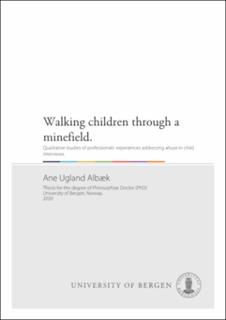Walking children through a minefield. : Qualitative studies of professionals’ experiences addressing abuse in child interviews.
Doctoral thesis
Permanent lenke
https://hdl.handle.net/1956/21406Utgivelsesdato
2020-01-31Metadata
Vis full innførselSamlinger
Sammendrag
Background: Ample research document that child abuse is widespread and that it is harmful to victims’ physical, psychological and social well-being. Protecting the victims from further abuse and offering them restorative care can reverse these negative effects, but evidence suggests that numerous children exposed to child abuse remain undetected, even if they have been in contact with health or social services. Further, research on explaining why professionals fail to reveal child abuse seem scarce. The aim of this thesis is to explore aspects important to better understand professionals’ lived experiences of addressing abuse in child interviews. Methods: We conducted two qualitative studies to realize this aim. The first study was a metasynthesis of international empirical, qualitative research on professionals’ experiences addressing child adversity, where our systematic literature search yielded eight eligible studies (paper I). We utilized meta-ethnographic comparative method and performed reciprocal translations by principles of thematic analysis and interpretative translation, as well as a line-of-argument synthesis. In the second study, we performed in-depth interviews With ten social workers in child protective services (CPS) and nine psychologists in child and adolescent mental health services (CAMS) (papers II and III). We approached the Research interviews within a hermeneutic phenomenological epistemology and used interpretive description to examine the data. Results: To convey the participants’ struggles exploring child abuse, we developed the metaphor “walking children through a minefield” in paper I. Three overarching themes supported the metaphor: (a) feeling inadequate, (b) fear of making it worse, and (c) facing evil. Metaphorically, the participants felt exploring child abuse resembled maneuvering through an unknown minefield without knowledge or training in how to avoid or to defuse mines. They felt lacking in competence, organizational support and/or recourses. Addressing abuse, the participants risked hurting both themselves and the child because they lacked control over outcomes. Moreover, they reported strong negative emotions exploring abuse and subsequent avoidance patterns. Because a dominant feature in our interview data was the participants’ negative reactions to explorative work, we explored their emotional experiences addressing child abuse in paper II. We captured the participants’ experiences in five themes: (a) facing children’s suffering caused by adults, (b) feeling mean, (c) doubting one’s ability and skills, (d) feeling one is betraying children, and (e) being obstructed by heavy workload and dysfunctional structure. Findings in paper II is illustrated with the image that addressing child abuse felt like plunging into a dark sea of emotions. Encountering emotion-provoking challenges both within themselves and from their environment made the participants feel guilty for not providing children the standards of care and support they believed the children needed and deserved. In paper III, we explored the participants’ experiences with facilitators to address abuse in child interviews. Based on the participants’ accounts we revealed that various facilitators relative to the stage of the skill development and intrinsic motivation of the professional ease explorative work. We developed five themes to convey these facilitators: (a) alleviating personal choice, (b) collective accountability, (c) sharing vulnerability, (d) finding your own way, and (e) doing it for the right reasons. The findings suggest that professionals’ facilitators for addressing abuse are two-dimensional; some facilitators alleviate their emotional strain and doubt, while other facilitators promote their job satisfaction. Conclusion: Overall, our findings show that addressing child abuse is challenging work due to its inherent complexity, unpredictability, and lack of control, and because it involves children’s suffering. These challenges inflict professionals with doubt, guilt, and frustration. To support professionals and reduce their challenges, it is important to offer help that can alleviate their emotional strain and promote their job satisfaction. Firstly, to remedy the situation organizations should be adapted to meet children’s needs, offer a supportive culture with shared vulnerability, and develop a culture and an organizational structure that promotes professionals’ autonomy. Secondly, services should implement goal-directed reflective practice with feedback on performance, as well as train professionals in adaptive emotion regulation strategies and relationship-building skills.
Består av
Paper I: Albaek, A. U., Kinn, L. G., & Milde, A. M. (2018). Walking Children Through a Minefield: How Professionals Experience Exploring Adverse Childhood Experiences. Qualitative Health Research, 28(2), 231-244. The article is available in the thesis file. The article is also available at: http://hdl.handle.net/1956/17574.Paper II: Albaek, A. U., Binder, P. E., & Milde, A. M. (2019). Plunging into a dark sea of emotions: Professionals’ Emotional Experiences addressing Child Abuse in Interviews with Children. Qualitative Health Research. The article is not available in the thesis file due to publisher restrictions. The published version is available at: https://doi.org/10.1177/1049732318825145.
Paper III: Albaek, A. U., Binder, P. E., & Milde, A. M. (2019). Entering an Emotional Minefield: Professionals’ Experiences with Facilitators to Address Abuse in Child Interviews. BMC Health Services Research. The article is available in the thesis file. The article is also available at: https://doi.org/10.1186/s12913-019-4128-8.
